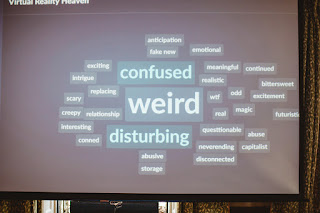Step 11: We are all experts
We see our arts-research performances as having two halves. The first half -in spite of our best efforts to blur the lines- sits close to a traditional theatre format. We pretend to be other people & the audience watches & listens. At the end of the first half however we break with tradition & take a bow. We come back to the stage devoid of our wigs & funny accents & talk with the audience about the process that brought us here. We outline some of the challenges we met along the way & we introduce our research colleagues.
When it works well it feels revelatory - as if somehow the story can’t continue to reach into the distance fantastical future without the support of everyone in the room. It’s like a confession: we don’t know what happens next - we made it up! Now, we need to get our heads together to see what feels most plausible in the real world - or possible or desirable or terrifying!
The post-show revelation works best when it contains some genuine surprise. Of course the audience knows that there are actors on-stage & the characters are fictional but recently we have taken to hiding our career-scientist colleagues amongst our cast. In both our quantum & VR performances, researchers took on non-speaking bit-parts in the show - as their fictional research descendants - only to reveal their true identity for the second part of the event. As well as being a fun trick to play on an unsuspecting public, it’s also a nice way to bring the researchers into our world & to share responsibility for the show’s success.
There are a number of ways of hosting the ensuing conversation. For Qupid (our quantum love story) we interviewed the on-stage scientists as themselves to compare & contrast the real & fictional worlds. In VR100 we handed over the reigns more readily to the researchers who had some specific questions they wanted to ask the audience.
Ideally, we stay on topic. We talk about the potential future ethics deriving from the fictional world of the play. This helps create a solid launchpad to then diversify into other applications, other possibilities. We let the theatre-makers talk about the world of the play, we let the researchers talk about the world of the researchers & finally, we let the audience talk about the world in general.
For me, this last moment is the most critical in the whole event if not in the whole year. Members of the public who may have previously known nothing about the subject in question have spent an hour or so thinking about something quite sophisticated & specific. Their brains will be reeling with questions, ideas & opinions which they should be allowed to ask & express freely. Their unfettered reactions are gold-dust to a researcher who is interested in Responsible Research & Innovation. Without knowing the background of every audience member in the room, we can be sure that we have diversity of experience & opinion… and the not-knowing makes us live to a host more possibilities. Suddenly, received wisdom takes on a different shade. What we thought we thought seems infinitely flawed. Alternatives & oppositions seem solid.
At the end of the night we hope to have created a genuine sense that there aren’t just a handful of experts in the room but that true wisdom & insight derives from the collective. We each have an equally valid & useful contribution to make. We are all experts.


Comments
Post a Comment